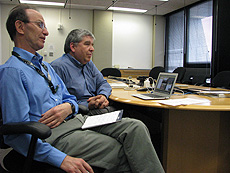Students turn scientist in QuarkNet masterclasses
 |
Argonne National Laboratory scientist James Proudfoot (left), students at the University of Massachusetts - Amherst, and students at Universidad Antonio Nariño in Bogota, Colombia, all meet at Fermilab for a QuarkNet masterclass. Kenneth Cecire (right) facilitates the meeting. |
The kids are at it again.
Over the past four weeks, hundreds of high school students around the world visited virtually with scientists at Fermilab to present their analyses of data taken from the Large Hadron Collider. The students were enthusiastic participants in the International Particle Physics Outreach Group's International Masterclasses, which culminated in videoconferences moderated from Fermilab.
This year, students from 38 different locations worldwide joined in the masterclasses.
"We encourage the scientists to take a back seat in the videoconference and let the students do the responding," said masterclass coordinator Kenneth Cecire of QuarkNet and Notre Dame University.
At each 45-minute workshop, students from two to four masterclass institutions videoconference with a scientist-moderator at Fermilab. Prior to dialing into the conference, they also meet with a mentor — a particle physicist at a nearby university — to learn how to interpret the analysis results of their data, which come from LHC's ATLAS and CMS experiments.
"The kids are getting real data," Cecire said. "They're working with large data sets that they wouldn't normally get to work with, and they learn to see data the way scientists do."
The masterclass organizers make it possible for multiple institutions to interact with each other, working together collaboratively much the way high-energy physicists work together on a global scale. In one of the sessions, students in Fairfax, Virginia, collaborated with students more than 2,000 miles away in Medellin, Colombia.
They also get to know their mentors not only as scientists, but as regular folks.
"At some point they stop asking, 'How do I understand the difference between jets and leptons?' and start asking, 'Do you like the Nationals or the Orioles?'" Cecire said.
Through multilevel interactions with the scientists, students get to understand them the way scientists understand each other — as moderator, mentor, peer, person.
"Every year I get anecdotes where the teacher says, "My kids want to be physicists'," Cecire said. "They might not go on to be scientists, but if they understand a little bit about what we do, it makes a big difference."
—Leah Hesla
|